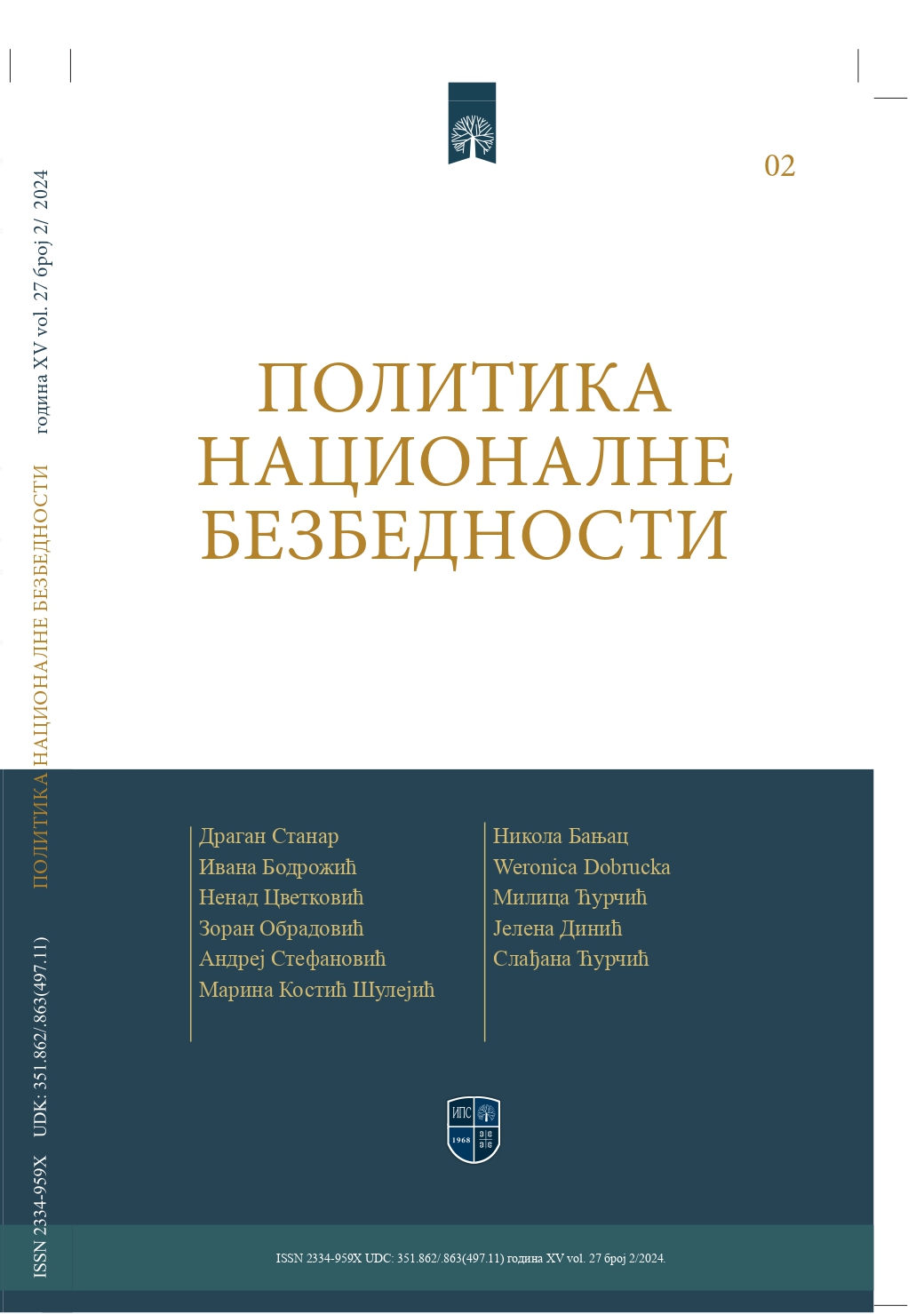CONTRIBUTION OF THE CONCEPT OF TOTAL DEFENCE TO STATE’S RESILIENCE IN EMERGENCY SITUATIONS
Abstract
Contemporary challenges, risks and threats to the security of the Republic of Serbia, as well as the global security situation, demand reestablishment of an efficient system of national security. Protection of the civilian population and material resources is particularly important in this turbulent condition, which calls for optimal development of the system of protection and rescue in accordance with the concept of total defence of the Republic of Serbia. This paper analyzes the strategic, normative and planning framework of the functioning of the system of national security (with an emphasis on the system of national defence) in the context of the contribution of the concept of total defence to the state’s resilience in emergency situations. The aim of this paper is to contribute to the understanding of the concept of total defence and strengthen its role in emergency situations by analyzing the current capabilities which must be upgraded and improved while also considering the need for the development of new capabilities. The basic hypothesis is that the development of the concept of total defence enables optimal state resilience in emergency situations. This paper also analyzes the legal and institutional framework of the concept of total defence in the context of emergency situations. Taking into account the historical heritage, this paper highlights the importance of the development of the security culture and resilience in society, which is crucial for the successful implementation of the concept of total defence. The conclusions reached by this paper point out the necessity of continuous improvement and adaptation of the system of total defence in accordance with the contemporary security challenges and needs of the Republic of Serbia.
References
Бабић, Бранко. 2016. „Цивилна одбрана Републике Србије.” Војно дело 68 (1): 154–178. DOI: 10.5937/vojdelo1602154V.
Закон о Војсци Србије, „Службени гласник Републике Србије”, бр. 116/2007-17, 88/2009-5, 101/2010-246 (др. закон), 10/2015-10, 88/2015-80 (УС), 36/2018-13, 94/2019-3, 74/2021-45 (УС).
Закон о одбрани, „Службени гласник Републике Србије”, бр. 116/2007, 88/2009, 88/2009 – др. закон, 104/2009 – др. закон, 10/2015 и 36/2018.
Закон о смањењу ризика од катастрофа и управљање ванредним ситуацијама, „Службени гласник Републике Србије”, бр. 87/2018.
Јончић, Милош. 2022. „Војно несврставање појам, развој, перспективе.” У Перспективе војне неутралности Републике Србије: између оспоравања и утврђивања, ур. Александара Митић и Петар Матић, посебно издање, Српска политичка мисао: 189–220. DOI: 10.22182/spm.specijal2022.7.
Кршљанин, Дејан В., и Самед М. Каровић. 2015. „Систем одбране у ванредним ситуацијама.” Војно дело 67 (4): 142–171. DOI: 10.5937/vojdelo1504142K.
Пешић, Миленко. 2024. „‛Тотална одбранеʼ као мираз Стокхолма НАТО-у.” Политика 4. март 2024. https://www.politika.rs/scc/clanak/602452/Totalna-odbrana-kao-miraz-Stokholma-NATO-u.
Станар, Драган Ж., и Срђан В. Старчевић. 2024. „Војна обавеза као део српског етоса.” Социолошки преглед 58 (2): 505–525. DOI: 10.5937/socpreg58-49221.
Стојковић. Дејан, и Блажо Радовић. 2024. Концепт тоталне одбране – сажетак. Београд: Медија центар „Одбрана”, Библиотека „Војна књига”
Стратегија националне безбедности Републике Србије, „Службени гласник Републике Србије”, бр. 94/2019-13.
Стратегија одбране Републике Србије, „Службени гласник Републике Србије”, бр. 94/2019-4.
Устав Републике Србије, „Службени гласник Републике Србије”, бр. 98/2006-3, 115/2021-3 (Амандмани I-XXIX), 16/2022-3.
Cutter, Susan. L., Kevin D. Ash, and Christopher T. Emrich. 2018. “The geographies of community disaster resilience.” Global Environmental Change 29: 65–77. DOI: 10.1016/j.gloenvcha.2014.08.005.
Cvetkovic, Vladimir. M., Aleksandra Nikolic, and Aleksandar Ivan. 2023. “The role of social media in teh process of informing the public about disaster risks.” Journal of Liberty and International Affairs 9 (2): 104–119. DOI: 10.47305/JLIA2392121c.
Cvetković, Vladimir M. 2020. Disaster Risk Management. Belgrade: Scientific-Professional Society for Disaster Risk Management.
Cvetković, Vladimir M. 2022. Taktika zaštite i spasavanja u katastrofama. Beograd: Naučno-stručno društvo za upravljanje rizicima u vanrednim situacijama.
Cvetković, Vladimir M., and Vanja Šišović. 2024. “Understanding the Sustainable Development of Community (Social) Disaster Resilience in Serbia: Demographic and Socio-Economic Impacts.” Sustainability, 16 (7): 2620. DOI: 10.3390/su16072620.
Cvetković, Vladimir M., Neda Nikolić, Adem Ocal, Jovana Martinović, and Aleksnadar Dragašević. 2022. “A Predictive Model of Pandemic Disaster Fear Caused by Coronavirus (COVID-19): Implications for Decision-Makers.” International journal of environmental research and public health 19 (2): 652. DOI: 10.3390/ijerph19020652.
Cvetković, Vladimir M., Tatijana Bugarski, i Jovana Martinović, J. 2022. “The Predictive Model of Citizens' Attitudes About the Risks of Introducing Death Penalty in the Serbian Criminal Justice System.” Nauka bezbednost policija 27 (2): 7–43. DOI: 10.5937/nabepo27-37302.
Cvetković, Vladimir M. 2021. „Jačanje Sistema integrisanog upravljanja rizicima od katastrofa u Srbiji: DISARIMES.” U Taktika zaštite i spasavanja u vanrednim situacijama: iskustva sa terena i pouke, ur. Vladimir M. Cvetković, 77–111. Beograd: Naučno-stručno društvo za upravljanje rizicima u vanrednim situacijama.
Cvetković, Vladimir M. 2023. Otpornost na katastrofe - Vodič za prevenciju, reagovanje i oporavak. Beograd: Naučno-stručno društvo za upravljanje rizicima u vanrednim situacijama.
Đukić, Anđelija, i Dejan Vuletić. 2023. „Organizacija sistema odbrane prema konceptu totalne odbrane na primeru Švajcarske, Švedske i Srbije.” Međunarodni problem 75 (4): 621–647. DOI: 10.2298/MEDJP2304621D.
Grozdanić, Goran, Vladimir M. Cvetković, Tin Lukić, and Aleksandar Ivanov. 2024. “Sustainable Earthquake Preparedness: A Cross-Cultural Comparative Analysis in Montenegro, North Macedonia, and Serbia.” Sustainability 16 (8): 3138. DOI: 10.3390/su16083138.
Lallerstedt, Karl. 2021. “Rebuilding Total Defense in a Globalized Deregulated Economy.” PRISM 9 (3): 90–105.
Napier, M., and Ferris, J. 2020. “The role of technology in disaster management.” Journal of Disaster Research 15 (2): 123–135. DOI: 10.20965/jdr.2020.p0123.
NATO. 2016. NATO Summit Guide, Warsaw, 8–9 July 2016. Brussels: NATO Public Diplomacy Division.
Saxi, Håkon Lunde, Bengt Sundelius, and Brett Swaney. 2020. “Baltics left of bang: Nordic total defence and implications for the Baltic Sea region.” Strategic forum, 304. National Defense University Press.
Tierney, Kathleen. 2019. Disasters: A sociological approach. Cambridge: Polity Press.
Veebel, Viljar, illimar Ploom, Liia Vihmand-Veebel, and Krzysztof Załeski. 2020. “Territorial defence, comprehensive defence and total defence: Meanings and differences in the Estonian defence force.” Journal on Baltic Security 6 (2): 1–13. DOI: 10.2478/jobs-2020-0007.

